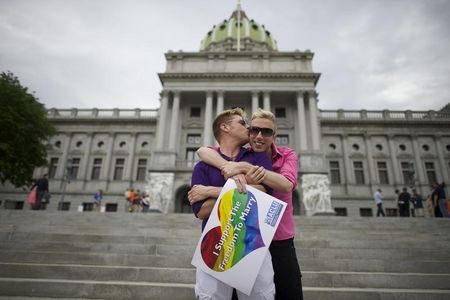By Fiona Ortiz and Lawrence Hurley
(Reuters) - A federal appeals court on Thursday bucked a recent trend of pro-gay marriage decisions by upholding state bans or restrictions in Kentucky, Michigan, Ohio and Tennessee, pressuring the Supreme Court to take up the issue.
The 2-1 ruling, by the Cincinnati-based 6th Circuit U.S. Court of Appeals, is the first ruling by a federal appeals court that upholds bans on same-sex marriage. Gay marriage advocates said they would immediately seek U.S. Supreme Court review.
The high court, if it agrees to hear the case, could potentially issue a decision by the end of June saying once and for all whether any states can ban gay marriage.
In Thursday's ruling, the appeals court upheld gay marriage bans in Kentucky and Michigan. It also ruled that Ohio, Tennessee and Kentucky are not required to recognize gay marriages that take place in other states.
Judge Jeffrey Sutton, appointed by Republican President George W. Bush, wrote the majority decision and said plaintiffs favoring same-sex marriage had not made the case why courts should intervene instead of leaving the matter to state legislatures.
"When the courts do not let the people resolve new social issues like this one, they perpetuate the idea that the heroes in these change events are judges and lawyers," he wrote.
It is preferable, he added, that courts defer to "the customary political processes, in which the people, gay and straight alike, become the heroes of their own stories."
Judge Martha Craig Daughtrey, the three-judge panel's lone Democratic appointee, in a dissenting opinion criticized the majority's ruling, saying it read like "an engrossing TED Talk" neglectful of its own impact on gay and lesbian couples.
"Instead of recognizing the plaintiffs as persons suffering actual harm as a result of being denied the right to marry where they reside, or the right to have their valid marriages recognized there, my colleagues view the plaintiffs as social activists who have somehow stumbled into federal court," she wrote.
The ruling is likely to put the spotlight back on the U.S. Supreme Court. It had been expected to take up the gay marriage issue in October but in a surprise move rejected seven cases. In doing so, it allowed gay marriage to go ahead in five new states and paved the way for the fall of bans in others.
At present, gay marriage is legal in 32 states. Thursday's decision means that appeals courts across the country are now divided, which could force the Supreme Court's hand.
In the ruling, Sutton played down the high court's action in October, saying lower courts are not bound by it.
He also said a June 2013 ruling by the high court that struck down a federal law denying federal benefits to same-sex couples did not conclusively resolve the issue.
He pointed out that the only time the justices have specifically addressed gay marriage was in 1972, in a case called Baker v. Nelson, when they upheld a ruling that prevented a gay couple in Minnesota from seeking a marriage license.
Advocates on both sides of the issue immediately called for the Supreme Court to make a definitive decision for the country.
"We will be filing for Supreme Court review right away and hope that through this deeply disappointing ruling, we will be able to bring a uniform rule of equality to the entire country," the American Civil Liberties Union said in a statement.
Michigan Attorney General Bill Schuette applauded Thursday's ruling as a victory for Michigan's constitution. "The U.S. Supreme Court will have the final word on this issue. The sooner they rule, the better, for Michigan and the country," Schuette said in a statement.
Dana Nessel, a lawyer who represents April DeBoer and Jayne Rowse, the couple who challenged the ban in Michigan, said she expects the Supreme Court to take up the issue soon. "We're optimistic that ultimately we are going to prevail on this and that same-sex marriage will be legalized in all 50 states ... by the end of this term," Nessel said in a telephone interview.
Attorney Joe Dunman, who represents the plaintiffs in the Kentucky cases, said all options were being considered, including a Supreme Court appeal.

They are extremely disappointed," Dunman said of the plaintiffs. "They want to keep fighting all the way to the top."
(Additional reporting by Jonathan Stempel and David Bailey; Editing by Sandra Maler, Kevin Drawbaugh, Joan Biskupic and Steve Orlofsky)
